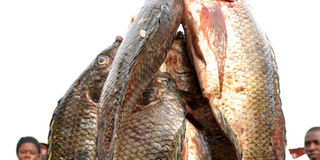Fish farmers advised to keep proper records to access loans

Fish from Lake Victoria. Bankers consider aquaculture a risky venture, partly because fish farmers lack proper books of records about their businesses. Photo by Rachel Mabala
What you need to know:
Most farmers go for loans without any risk assessment
Fish farmers and other aquaculture sector players have been advised to keep proper records and continuously research in order to access loans to finance their businesses.
Davidson Madira, a financial consultant and managing director of Natural Enterprise Development limited said while the portfolio of the banking sector is not so much in support of agriculture and aquaculture, fish farmers ought to present proper records of their businesses in order to benefit.
Mr Madira said, “Banks are not interested in security but the ability to pay back. I do not see the portfolio of the banking sector in support of the fish farming industry because despite the fact that it is one of the most profitable ventures, the sector lacks proper records and the farmers themselves seem not to understand a number of things, that makes aquaculture a high risk.”
He added that most farmers go for loans without any risk assessment. “Without proper research, in the eyes of an investment banker the venture is 68 per cent dead. If you come to the bank to borrow money and you have no qualification in fish farming or none of your staff is qualified in that area, no financer will give you money.”
Unprofessional aquaculturalists
Andrew Ario, the assistant commissioner in charge of aquaculture, said most fish farmers in Uganda are not professionals hence the higher chances of gambling.
He also noted that in the early 2000 there was a lot of government money in the sub sector in form of grants which is said to have made some ‘lazy.’
“When it comes to collateral, some bring assets that are not viable hence the high interest rates.”
In 2003, the government wanted to increase fish production by helping farmers access quality seeds or fingerings under the project of restocking water bodies.
According to official figures from the Ministry of agriculture, animal industry and fisheries about 1.2 million people are directly employed and another 1.5 million people are supported by the fish industry in Uganda.




